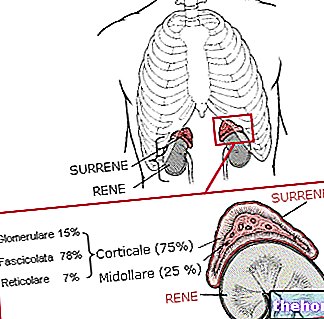AULIN ® is a drug based on Nimesulide
THERAPEUTIC GROUP: Non-steroidal anti-inflammatory and antirheumatic drugs

Indications AULIN ® Nimesulide
AULIN ® is indicated for the short-term symptomatic treatment of acute inflammatory or gynecological pain, such as that present in the case of dysmenorrhea.
Mechanism of action AULIN ® Nimesulide
Nimesulide, the active ingredient of AULIN ®, is a non-steroidal anti-inflammatory drug which, due to its particular chemical properties, and in particular for the sulfoanilide functional group, represents the progenitor of the subclass of sulfonamides.
This non-acid active principle, taken orally, reaches the gastric environment where converted into the protonated form, it becomes more liposoluble by crossing cell membranes very easily and thus maintaining a bioavailability greater than 50% of the total dose taken.
Reached the plasma peak after about 2 hours and bound to plasma proteins, nimesulide is distributed among the various organs and systems where it exerts its therapeutic action
In fact, different studies have shown how this active ingredient can mainly exert an inhibitory effect against COX2, guaranteeing:
- The inhibition of the synthesis of prostaglandins such as PGE2, with pro-inflammatory, algogenic and pyrogenic action;
- A sensitive antioxidant action, hindering the release of oxidizing agents by neutrophils and detoxifying the organism from the pathogenic action of the superoxide anion;
- A protection of cartilage tissues and the extracellular matrix by inhibiting some enzymes with proteolytic activity and known as metalloproteases.
All the above molecular mechanisms of action allow nimesulide to act as an anti-inflammatory and analgesic, while preserving the protective action of some prostaglandins on the health of the gastric mucosa.
Once its activity is over, after about 3-5 hours, it is metabolized in the liver by the cytochromial system CYP2C9 and subsequently eliminated in the form of an inactive metabolite mainly through the urine.
Studies carried out and clinical efficacy
1.NIMESULIDE AS AN ANTICANCER AGENT
Eur J Med Chem. 2012 Jan; 47: 432-44. Epub 2011 Nov 15.
From COX-2 inhibitor nimesulide to potent anti-cancer agent: synthesis, in vitro, in vivo and pharmacokinetic evaluation.
Zhong B, Cai X, Chennamaneni S, Yi X, Liu L, Pink JJ, Dowlati A, Xu Y, Zhou A, Su B.
Experimental study evaluating the efficacy of COX2 inhibitors such as nimesulide in the treatment of neoplastic pathologies. More precisely, this active principle has been shown to be able to reduce the growth of breast cancer cells, making it safe and tolerable from a pharmacokinetic point of view.
2 .NIMESULIDE IN THE PROTECTION OF NEURONAL DAMAGE
J Neurotrauma. 2012 May 1; 29: 1518-29. Epub 2012 Mar 29.
Magnesium sulfate and nimesulide have synergistic effects on rescuing brain damage after transient focal ischemia.
Wang LC, Huang CY, Wang HK, Wu MH, Tsai KJ.
Very interesting experimental study that demonstrates how the simultaneous intake of nimesulide and magnesium sulfate can reduce the neuronal damage induced by transient ischemic events.
3. BLOODING ASSOCIATED WITH THE USE OF NIMESULIDE
J Med Case Reports. 2011 Dec 9; 5: 568.
Bilateral spontaneous retroperitoneal bleeding in a patient onnimesulide: a case report.
Mitsogiannis IC, Chatzidarellis E, Skolarikos A, Papatsoris A, Anagnostopoulou G, Karagiotis E.
Case report denouncing an important side effect associated with nimesulide treatment in a 50-year-old patient with ankylosing spondylitis. In this case, retroperitoneal haemorrhage risked seriously compromising renal function.
Method of use and dosage
AULIN ®
100 mg tablets of nimesulide;
Granules for oral suspension of 50 or 100 mg of nimesulide;
Suppository for rectal use of 200 mg of nimesulide.
For the treatment of acute pain, adults are generally advised to take a tablet or a 100 mg sachet of nimesulide, twice a day, preferably after meals, or a 200 mg suppository, always twice a day. .
The dosage could be reviewed by your doctor based on the severity of the pathology, the therapeutic efficacy and above all the contextual presence of pathologies affecting the liver and kidney.
AULIN ® Nimesulide warnings
Therapy with AULIN ® should be understood as a short-term symptomatic therapy, useful for overcoming acute painful states.
For this reason, and since the incidence of side effects is proportional to the duration of therapy, it would be advisable to limit the intake of nimesulide to the shortest possible time.
Particular caution should be exercised by patients suffering from hepatic, renal or gastrointestinal diseases, who should consult their doctor before starting AULIN and agree on periodic monitoring of the efficacy and safety of the therapy.
Should undesirable effects appear, the patient should immediately contact their doctor, considering the possibility of immediately stopping the current therapy.
AULIN ® in tablets contains lactose, therefore its intake is not recommended in patients with lactose intolerance, lactase enzyme deficiency and glucose-galactose malabsorption syndrome.
AULIN ® granules for oral suspension, on the other hand, contains sucrose, making it unsuitable for patients suffering from hereditary syndromes of fructose intolerance, glucose / galactose malabsorption and sucrose-isomaltase deficiency.
PREGNANCY AND BREASTFEEDING
Given the ability of nimesulide to significantly reduce the production of prostaglandins, molecules useful for ensuring correct fetal and embryonic development, the use of AULIN ® is contraindicated throughout pregnancy.
In fact, different studies show how the assumption of NSAIDs during gestation can significantly increase the risk of malformations in the respiratory and cardiovascular system of the unborn child, while increasing the risk of bleeding and complications at the time of delivery.
Interactions
Like other non-steroidal anti-inflammatory drugs, nimesulide could also interact with different active ingredients capable of varying both their pharmacokinetic and pharmacodynamic characteristics and their safety profile.
For this reason, the patient should pay particular attention to the contextual intake of:
- Diuretics, ACE inhibitors, angiotensin II antagonists, methotrexate and cyclosporine, capable of increasing the renal toxicity of nimesulide;
- Valproic acid, fenofibrates, salicylates, tolbutamide able to compete with nimesulide for binding to the active site, thus reducing its therapeutic efficacy;
- Active ingredients capable of altering gastric motility, thus causing significant changes in the absorption of the drug;
- Antibiotics and substrates of cytochromial enzymes, due to the alterations in the pharmacokinetic and pharmacodynamic properties;
- NSAIDs and opioids, given the increased analgesic effect of their interaction;
- Anticoagulants, given the increased risk of bleeding associated with the simultaneous use of NSAIDs.
Contraindications AULIN ® Nimesulide
The use of AULIN ® is contraindicated in case of hypersensitivity to the active substance or to one of its excipients, hepatic and renal insufficiency, gastric ulcers and gastrointestinal pathologies and severe heart failure.
Undesirable Effects - Side Effects
Although nimesulide presents a direct inhibitory activity mainly against COX2, reducing the risk of adverse reactions affecting the gastrointestinal tract, it is useful to remember how AULIN ® therapy can determine the appearance of:
- Allergic-based dermatological reactions such as skin rash, itching, hives and edema;
- Hematological reactions such as anemia, neutrophilia, thrombocytopenia, cytopenia granule;
- Central reactions such as sleepiness, headache, insomnia and dizziness;
- Cardiovascular reactions such as tachycardia and hypertension;
- Gastrointestinal reactions such as epigastric pain, nausea, vomiting, diarrhea and gastralgia;
- Metabolic reactions such as hyperkalaemia;
- Respiratory reactions on an allergic basis such as asthma, dyspnoea and bronchospasm;
- Urogenital disorders such as dysuria, oliguria and isolated hematuria;
- Changes in liver function.
In most cases, however, these side effects have affected patients predisposed or subjected to inadequate and prolonged treatments over time.
Note
AULIN ® is a drug subject to mandatory medical prescription.
The information on AULIN ® Nimesulide published on this page may be out of date or incomplete. For a correct use of this information, see the Disclaimer and useful information page.




























